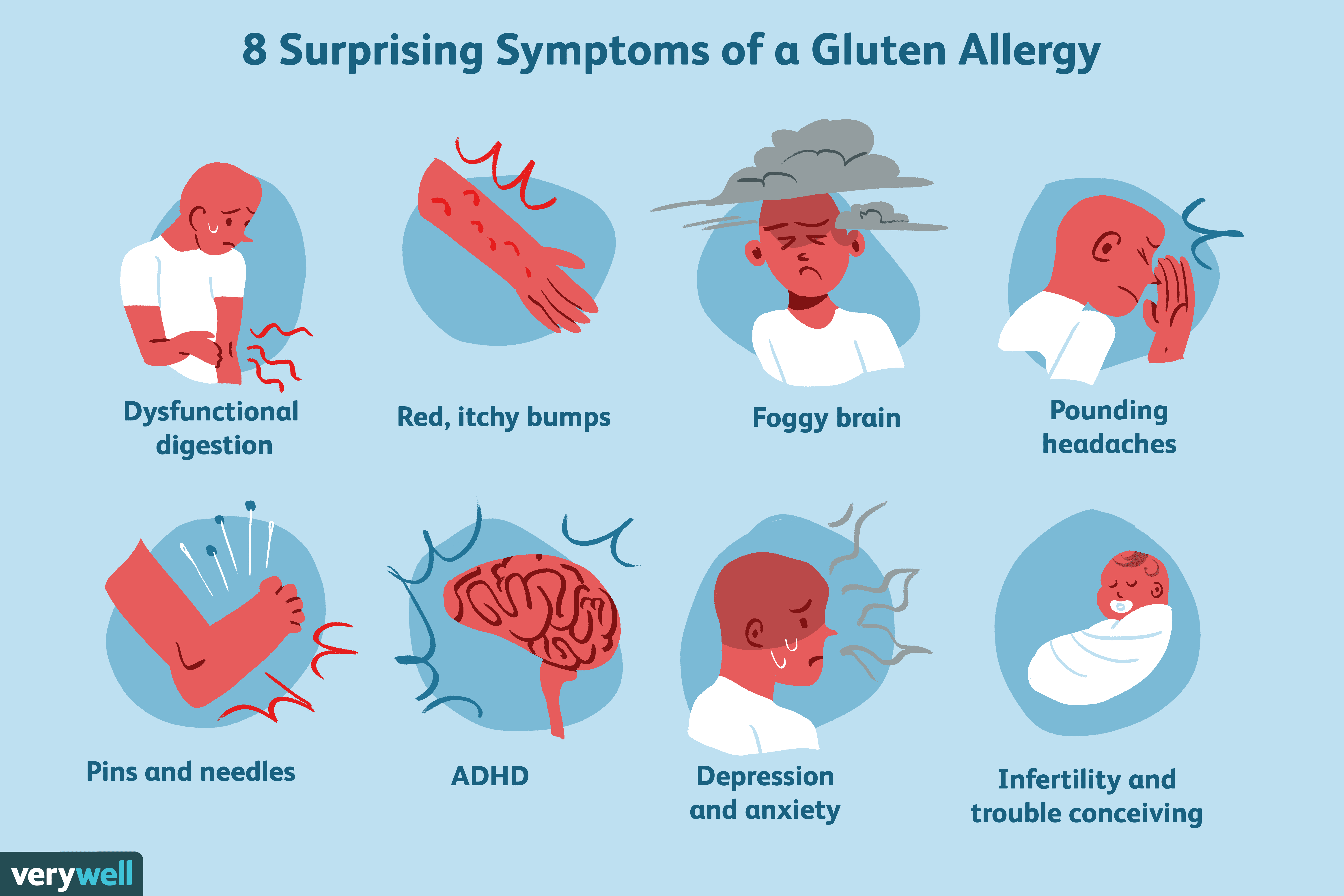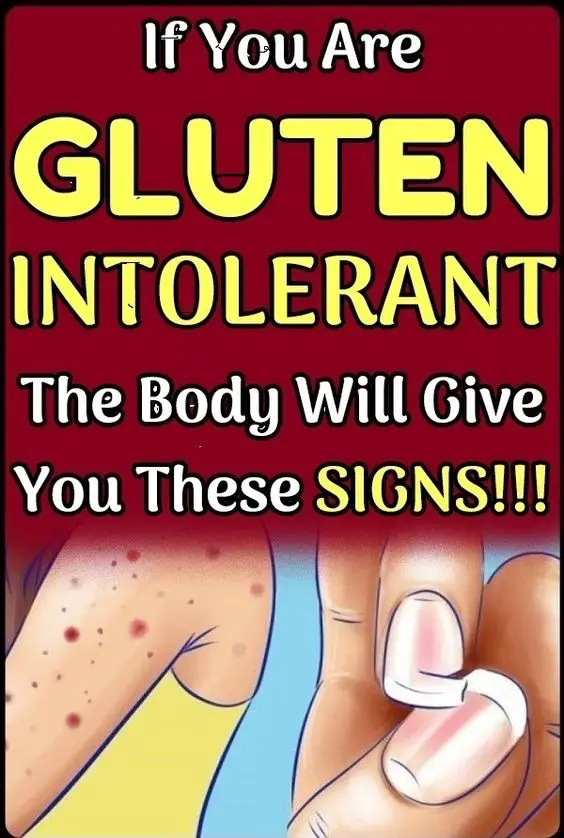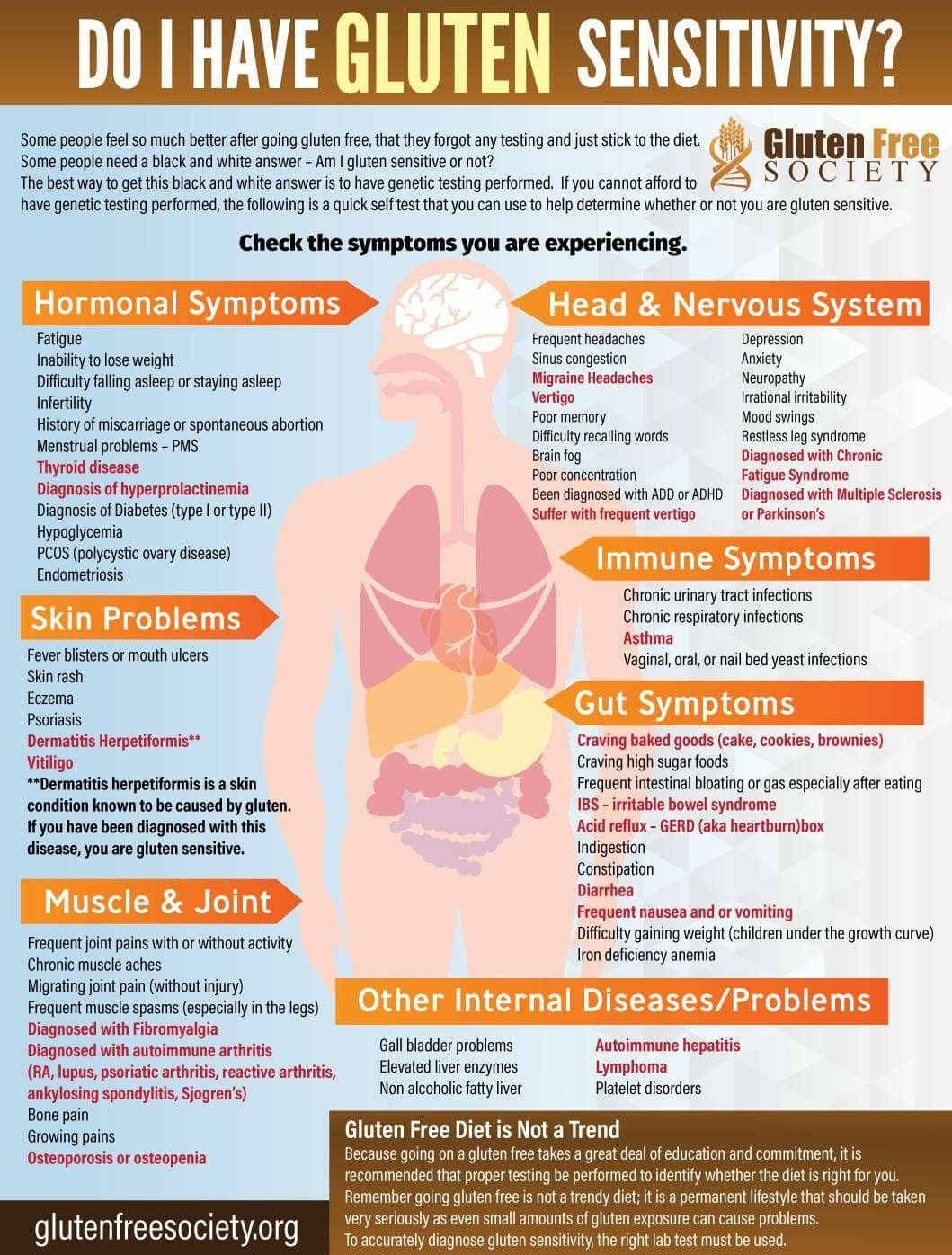Celiac Disease Vs Gluten Sensitivity Vs Wheat Allergy
To help pinpoint what might be ailing you, it helps to understand the basics of three common gluten and wheat-related health conditions, as well as the differences between them.
Celiac disease is a chronic immune-mediated disorder. If you have CD, ingesting gluten damages the lining of the small intestine, making it difficult to absorb necessary nutrients. The condition is genetic, and experts believe it affects around one in every 150 people, although it may be underdiagnosed, since many people with CD may not even be aware that they have it.
Some people with a mild form of the disease may not experience any symptoms. Most however, will develop common signs like diarrhea, constipation, gas, bloating, abdominal pain, fatigue and sometimes nausea or vomiting. Some people with celiac disease may not have digestive issues but develop other symptoms, such as bone or joint pain, depression or anxiety, headaches, mouth problems, like canker sores or dry mouth, a smooth, shiny tongue and tingling or numbness in their hands and feet. Reactions typically arent immediate and symptoms may appear several hours after eating gluten. Left untreated, CD can lead to malnutrition, dermatitis herpetiformis , infertility, anemia, osteoporosis and a higher risk of some cancers, among other health problems.
Wheat allergy is like other food allergies, in which your bodys immune system overreacts to a substance most people find harmless in this case, wheat.
So How Can You Tell Which ‘gluten Allergy’ You Have
It’s clear you can’t tell from symptoms alone. The truth is, you’ll need to see your healthcare provider and have some medical testing to determine which of these gluten-related conditions if any you might actually have.
If you have gastrointestinal symptoms that may point to celiac disease, you’ll likely start with celiac blood tests. If those are positive, your healthcare provider will likely recommend you undergo an endoscopy, a procedure that enables your healthcare provider to look directly at your small intestine and take samples for laboratory examination. Read more about all this: Celiac Disease Tests – How To Get Diagnosed
If, on the other hand, your celiac blood tests are negative, then your healthcare provider may consider the possibility of non-celiac gluten sensitivity or another condition such as irritable bowel syndrome, and may recommend tests for gluten sensitivity.
Wheat allergy is usually diagnosed with skin prick tests, although your healthcare provider may also use a blood test that looks for specific antibodies to wheat proteins.
For people with rashes they believe may be dermatitis herpetiformis, the first step is likely a visit to a dermatologist, who may recommend a skin biopsy of characteristic deposits of antibodies in your rash area.
And finally, if your symptoms are indicative of gluten ataxia, the path to diagnosis unfortunately isn’t straightforward, although there are several tests your neurologist may want to perform.
What Does A Gluten Intolerance Feel Like
Screenings suggest 1 in 100 people have coeliac disease in the UK, but only 24% of people with the condition are clinically diagnosed. This makes it much more common than previously thought. Coeliac disease is an autoimmune disease. Its often the most severe form of gluten intolerance. In extreme cases, it causes damage to the digestive system, malnutrition, and osteoporosis. But, non-coeliac gluten sensitivity causes symptoms often identical to those of coeliac disease. The difference between the two conditions is the process your body undergoes when reacting to gluten.
The reason why a lot of gluten intolerance goes undiagnosed is due to the wide-ranging symptoms which vary between individuals. The symptoms of gluten intolerance sometimes dont have anything to do with digestion. This means making the connection between what you are feeling and what you are eating is more difficult than you think. Below are some of the common symptoms that could signal you are experiencing gluten intolerance.
Don’t Miss: Is Oatly Milk Gluten Free
Diagnosing Gluten Sensitivity / Gluten Intolerance
It is important to distinguish between celiac disease and non-celiac gluten sensitivity, also known as gluten intolerance, in order to ensure you get the right care. Your doctor can test for celiac disease with a simple blood test. If your test results for celiac disease are negative but you still have symptoms, you may then be diagnosed with non-celiac gluten sensitivity. Learn more about getting tested for celiac disease.
An important note on getting tested: you must continue to eat gluten. Going gluten-free before getting tested can affect your results. If youre already gluten-free but want to get tested, consider undergoing a gluten challenge.
Complete our celiac disease symptoms checklist and then share the results with your doctor to get the conversation about getting testing started.
Easy Gluten Free Pizza

Prepare for your next family pizza night with this Easy Gluten Free Pizza recipe. A gluten free pizza that’s simple and delicious, it’s sure to be a hit at the dinner table. Made with our Gluten Free All Purpose Baking Flour, this pizza can be topped with whatever you like, as long as it’s free of gluten! In this recipe, we chose to top our pizza with fresh vegetables, and hummus making it a vegan dish.
Read Also: Is Wishbone Italian Dressing Gluten Free
Signs Youre Gluten Intolerant
More than 55 diseases have been linked to gluten, the protein found in wheat, rye, and barley. Its estimated that 99% of the people who have either gluten intolerance or celiac disease are never diagnosed.It is also estimated that as much as 15% of the US population is gluten intolerant. Could you be one of them?
Also Check: Gluten Free Graham Crackers Walmart
Dermatitis Herpetiformis: The Itchiest Rash Imaginable
It’s not unusual for a true allergic reaction to result in a skin rash, so it makes some intuitive sense to call dermatitis herpetiformis a “gluten allergy,” as it causes a remarkably itchy, persistent rash. But this rash is not the result of a true allergy: dermatitis herpetiformis is an autoimmune skin condition that occurs when you’ve eaten gluten grains. Symptoms include:
- Reddened skin
- Multiple small bumps that look like pimples
- Itching and burning
- Purple marks where bumps are healing
Dermatitis herpetiformis can occur anywhere on your body, but the most common locations for this rash are your buttocks, elbows, knees and on the back of your neck. If you’re about to have an outbreak, the itching usually starts even before you see the bumps appear. The condition is closely related to celiac disease and is associated with celiac disease.
Read Also: Where To Buy Vital Wheat Gluten
What Causes Gluten Sensitivity
While the underlying cause is not exactly known, the cause of gluten sensitivity is the consumption of foods that contain gluten.
As we mentioned, gliadin and glutenin are the proteins that can cause symptoms of gluten intolerance to flare up. When people with gluten intolerance are not able to break these proteins down properly, then they can experience extremely uncomfortable symptoms.
What Is Coeliac Disease
Coeliac disease is an autoimmune disease where the lining of the small intestine is damaged by tiny amounts of gluten .
If you have coeliac disease, your immune systems response to gluten causes damage to the small intestine when the tiny, finger-like projections lining the bowel, called villi, become inflamed and flattened. This is called villous atrophy and it reduces the available surface area of the bowel to absorb nutrients from food.
It is a serious medical condition. If its not well controlled it can lead to complications such as osteoporosis, infertility, chronic poor health, depression and teeth problems. However, early diagnosis and treatment of coeliac disease significantly reduces the risk of most complications ever occurring.
Coeliac disease affects people of all ages and gender. It runs in families and can develop at any age from infancy to adulthood. If you have coeliac disease, you should tell close relatives who share your genes that you have coeliac disease, so they can be tested.
Read Also: How Do You Tell If Your Gluten Intolerant
Gluten Intolerance: Foods To Eat And Foods To Avoid
With the gluten intolerance symptoms checklist out of the way, you now need to plan your diet to be sure that no gluten in any form enters your body.
To do so, your mind should be clear about the foods you can take and the foods that have to be avoided.
Thus, here weve got a few examples laid down to help you plan your eating routine.
Firstly, well talk about the foods that you can eat.
Recommended Reading: Gluten Free Pizza Crust Publix
What Should You Do If You Think You May Be Non Coeliac Gluten Sensitive
If you are experiencing symptoms when eating foods that contain wheat, barley, rye or oats and think you may have a sensitivity to gluten, its important to first rule out coeliac disease.
We do not recommend trying a gluten free diet as a first option if you are experiencing symptoms because this could prevent a coeliac disease test from giving you an accurate result.
Check if your symptoms are related to coeliac disease by taking our online assessment. If the results are positive, you can take them to your GP to ask for further testing for coeliac disease. Its essential to keep eating gluten for the tests to work.
If you get a negative test result for coeliac disease and other causes of your symptoms have been ruled out, you might wish to discuss the possibility of non coeliac gluten sensitivity with your healthcare team.
If you need to follow a gluten free diet, we can help you get the hang of it. We help everyone who needs to live gluten free live happier, healthier lives. Find out more.
Read Also: Gluten Free Meal Box Delivery
What Is Gluten Intolerance
Non-celiac gluten intolerance or sensitivity is a condition characterized by unpleasant symptoms onset by gluten-containing foods. Gastrointestinal gluten sensitivity symptoms include bloating, gas, abdominal pain, indigestion, diarrhea, and/or constipation. Other signs of gluten intolerance include brain fog, depression, headaches, joint pain, dermatitis or skin rash, and chronic fatigue. Its worth noting that there have been close to 200 different symptoms reported with gluten intolerance. However, much of the literature indicates that many are over-emphasized, thus making it difficult and controversial to diagnose.
Whats The Difference Between Gluten Sensitivity And Celiac Disease

Celiac disease is an autoimmune condition triggered by gluten. People with celiac disease have intestinal damage when they eat gluten. People who are gluten intolerant, while they may experience symptoms similar to those with celiac disease, do not have the intestinal damage or antibodies found in those with celiac disease.
New research indicates that gluten could cause brain damage in people with gluten intolerance, although more research is needed to confirm this.
Also Check: Gluten Free Pasta Vs Regular Pasta
The Fine Line Between Sensitivity And Celiac Disease
Celiac disease affects about 1 percent of Americans and develops in response to gluten exposure in people who are genetically predisposed. Its an autoimmune disorder in which the bodys immune system mistakenly launches an attack on the small intestine, inhibiting its ability to properly absorb nutrients and resulting in inflammation.
This inflammation in the small intestine can have health ramifications for the patient because it can impact their ability to absorb foods, can cause malnutrition, and they can have weight loss, said Rabia De Latour, a gastroenterologist and assistant professor of medicine at NYU Langone Health.
Gluten-containing food can cause people with celiac disease to experience uncomfortable gastrointestinal symptoms like bloating, diarrhea, weight loss and constipation, along with other problems like vitamin and mineral deficiencies, iron deficiency, anemia, joint pain, osteoporosis and more.
Non-celiac gluten sensitivity, on the other hand, is not an autoimmune disorder and doesnt involve gut inflammation. People living with this issue typically dont have the more serious complications of celiac, like malnutrition and weight loss, because, at the end of the day, their small intestine isnt actually inflamed, De Latour said.
Gluten sensitivity is also more mysterious in terms of how it presents, how long it lasts, how it can be diagnosed and its long-term risks or complications.
How Is Gluten Intolerance Treated
Theres no cure for gluten intolerance. But most people find relief from symptoms by following a gluten-free diet. You should work with your healthcare provider and a dietitian to plan your diet.
You can also ask your healthcare provider about adding probiotics to your diet. Probiotics help increase the good bacteria in your gut. They may reduce symptoms of bloating, gas or constipation.
Some research suggests that taking certain enzymes may help you digest gluten. But experts are still investigating this treatment. Talk to your healthcare provider before taking any enzymes.
Also Check: New Planet Gluten Free Beer
How Is Ncgs Treated
Many people cut gluten from their diet because they think they are intolerant to it. But because it’s hard to know whether the symptoms are due to an intolerance to gluten, an intolerance to something else in wheat, or some other reason, see your doctor for an accurate diagnosis to prevent unnecessary avoidance of gluten. Your doctor can make a referral to a dietitian to help you make decisions about your diet.
Very few people need to cut out gluten from their diet . However, if your doctor thinks this is the best approach for you, a dietitian can teach you how to replace the nutrients you will miss out on with a gluten-free diet. Read more about the gluten-free diet.
Getting A Proper Diagnosis Is Key
Getting a proper diagnosis is the first step toward feeling better and living a healthy life. Diagnosing celiac disease is pretty straight forward. A gastroenterologist will be able to make a diagnosis based on blood tests and a biopsy of the small intestine.
Diagnosing non-celiac gluten intolerance is a little trickier. Your physician will test you for celiac disease, wheat allergy and other things that might be associated with your particular symptoms. If you test negatively for those things, youll start a gluten-free diet. If going gluten-free for a while improves your symptoms, youll probably be diagnosed with non-celiac gluten intolerance.
If you think you might have a gluten intolerance, its important to keep gluten in your diet until you visit your physician. This is the only way the to test properly.
Don’t Miss: Gluten Free Tortellini Whole Foods
Certain Seasonings And Condiments
The following seasonings and condiments are safe for those following gluten-free diets:
- apple cider vinegar
- fresh herbs like basil, rosemary, and cilantro
- pesto
Most sources of healthy fat, such as the following, are gluten-free.
- full fat yogurt
- unsweetened coconut
Summary
Foods that are safe to eat if you have a gluten intolerance include nuts, seeds, vegetables, fruits, fish, poultry, dairy products, gluten-free grains, and legumes.
Signs You Have A Gluten Intolerance
Gluten intolerance can come in many forms, with the most serious resulting in a wheat allergy or Celiac disease. A wheat allergy is a type of immune response triggered by ingesting products containing wheat proteins such as gluten. Celiac disease, on the other hand, is an autoimmune disorder that damages the villi in the small intestine.
That said, symptoms of gluten sensitivity may not present immediately after consumption, rather an onset of symptoms often occur within 24 to 48 hours of ingesting gluten, says Abby Vichill, M.S., RDN, L.D. So, when it comes to investigating gluten as a cause of health issues, give yourself time to see if these symptoms arise:
Also Check: Gluten Free Panko Bread Crumbs
Research Into Non Coeliac Gluten Sensitivity
Non coeliac gluten sensitivity is a condition that is being recognised as a problem in many countries across the world. This is a new area and we need more research to understand the condition and who is at risk. There are no specific diagnostic tests for non coeliac gluten sensitivity.
Some researchers define non coeliac gluten sensitivity as an improvement in symptoms when following a gluten free diet. However, it is difficult to rule out the possibility of a placebo effect.
There is also some debate around whether gluten is the cause of the sensitivity or if other components are to blame. These components are also removed from the diet when gluten containing ingredients are removed, for example Fermentable Oligo- Di- Mono-saccharides and Polyols and other non gluten proteins found in wheat.
Well It Depends On What Condition You Actually Have

Robert Burakoff, MD, MPH, is board-certified in gastroentrology. He is the vice chair for ambulatory services for the department of medicine at Weill Cornell Medical College in New York, where he is also a professor. He was the founding editor and co-editor in chief of Inflammatory Bowel Diseases.
So you have persistent symptomspossibly digestive, possibly skin-related or even neurologicaland you’re wondering, do these symptoms mean I have a gluten allergy? You might be surprised to learn that there are several different conditions that people refer to as a “gluten allergy,” and your specific symptoms will depend on which of these conditions you actually have .
You see, medical science doesn’t actually recognize the term “gluten allergy.” Instead, when people refer to a gluten allergy, it’s likely they mean one of four different conditions: celiac disease, non-celiac gluten sensitivity, dermatitis herpetiformis or gluten ataxia. None of these is a true allergy. It’s also possible that someone who refers to a gluten allergy actually means a wheat allergy, which is a true allergy.
Here’s a guide to the different sets of symptoms and related issues that are commonly referred to as gluten allergies.
You May Like: Are Tyson Blackened Chicken Strips Gluten Free
